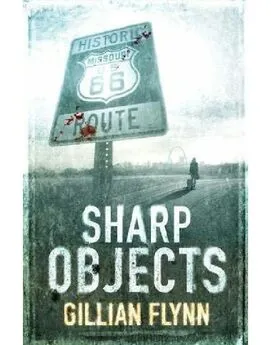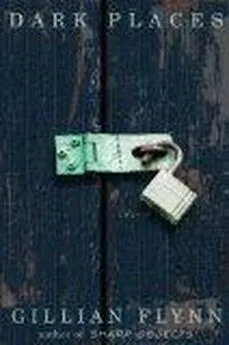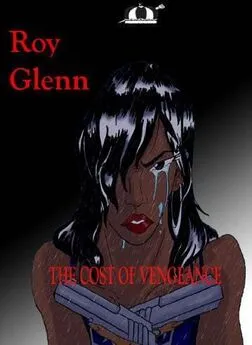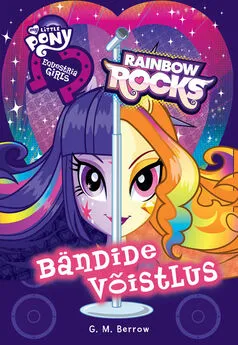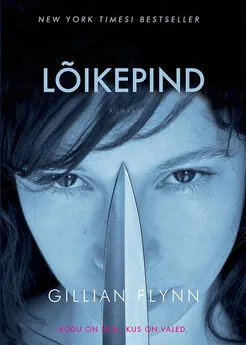Flynn, Gillian - Sharp_Objects
- Название:Sharp_Objects
- Автор:
- Жанр:
- Издательство:неизвестно
- Год:неизвестен
- ISBN:нет данных
- Рейтинг:
- Избранное:Добавить в избранное
-
Отзывы:
-
Ваша оценка:
Flynn, Gillian - Sharp_Objects краткое содержание
Sharp_Objects - читать онлайн бесплатно полную версию (весь текст целиком)
Интервал:
Закладка:
Curry thought the piece was solid—not great, mind you, but a solid start. He even left in my overfried line: “A serial killer who’s targeting children.” That should have been cut, I knew it myself, but I craved the dramatic padding. He must have been drunk when he read it.
He ordered a larger feature on the families, soon as I could scrape it together. Another chance to redeem myself. I was lucky—it looked like the Chicago Daily Post might have Wind Gap to ourselves for a bit longer. A congressional sex scandal was unraveling delightfully, destroying not just one austere House member, but three. Two of them women. Lurid, juicy stuff. More importantly, there was a serial killer stalking a more glamorous city, Seattle. Amid the fog and coffeehouses, someone was carving up pregnant women, opening their bellies, and arranging the contents in shocking tableaux for his own amusement. Thus it was our good fortune that reporters for this type of thing were out of commission. There was just me, left wretched in my childhood bed.
Islept late into Wednesday, sweaty sheets and blankets pulled over my head. Woke several times to phones ringing, the maid vacuuming outside my door, a lawn mower. I was desperate to remain asleep, but the day kept bobbing through. I kept my eyes closed and imagined myself back in Chicago, on my rickety slice of a bed in my studio apartment facing the brick back of a supermarket. I had a cardboard dresser purchased at that supermarket when I moved in four years ago, and a plastic table on which I ate from a set of weightless yellow plates and bent, tinny flatware. I worried that I hadn’t watered my lone plant, a slightly yellow fern I’d found by my neighbors’ trash. Then I remembered I’d tossed the dead thing out two months ago. I tried to imagine other images from my life in Chicago: my cubicle at work, my superintendent who still didn’t know my name, the dull green Christmas lights the supermarket had yet to take down. A scattering of friendly acquaintances who probably hadn’t noticed I’d been gone.
I hated being in Wind Gap, but home held no comfort either.
I pulled a flask of warm vodka from my duffel bag and got back in bed. Then, sipping, I assessed my surroundings. I’d expected my mother to pave over my bedroom as soon as I’d left the house, but it looked exactly as it was more than a decade before. I regretted what a serious teenager I’d been: There were no posters of pop stars or favorite movies, no girlish collections of photos or corsages. Instead there were paintings of sailboats, proper pastel pastorals, a portrait of Eleanor Roosevelt. The latter was particularly strange, since I’d known little about Mrs. Roosevelt, except that she was good, which at the time I suppose was enough. Given my druthers now, I’d prefer a snapshot of Warren Harding’s wife, “the Duchess,” who recorded the smallest offenses in a little red notebook and avenged herself accordingly. Today I like my first ladies with a little bite.
I drank more vodka. There was nothing I wanted to do more than be unconscious again, wrapped in black, gone away. I was raw. I felt swollen with potential tears, like a water balloon filled to burst. Begging for a pin prick. Wind Gap was unhealthy for me. This home was unhealthy for me.
A quiet knock at the door, little more than a rattling gust.
“Yes?” I tucked my glass of vodka to the side of the bed.
“Camille? It’s your mother.”
“Yes?”
“I brought you some lotion.”
I walked to the door a bit blurrily, the vodka giving me that first necessary layer to deal with this particular place on this particular day. I’d been good about booze for six months, but nothing counted here. Outside my door my mother hovered, peering in warily as if it were the trophy room of a dead child. Close. She held out a large pale green tube.
“It has vitamin E. I picked it up this morning.”
My mother believes in the palliative effects of vitamin E, as if slathering enough on will make me smooth and flawless again. It hasn’t worked yet.
“Thank you.”
Her eyes scanned across my neck, my arms, my legs, all bared by the lone T-shirt I’d worn to bed. Then back with a frown to my face. She sighed and shook her head slightly. Then she just stood there.
“Was the funeral very hard on you, Momma?” Even now, I couldn’t resist making a small conversational offering.
“It was. So much was similar. That little casket.”
“It was hard for me, too,” I nudged. “I was actually surprised how hard. I miss her. Still. Isn’t that weird?”
“It would be weird if you didn’t. She’s your sister. It’s almost as painful as losing a child. Even though you were so young.” Downstairs, Alan was whistling elaborately, but my mother seemed not to hear. “I didn’t care much for that open letter Jeannie Keene read,” she continued. “It’s a funeral, not a political rally. And why were they all dressed so informally?”
“I thought the letter was nice. It was heartfelt,” I said. “Didn’t you read anything at Marian’s funeral?”
“No, no. I could barely stand, much less give speeches. I can’t believe you can’t remember these things, Camille. I’d think you’d be embarrassed to have forgotten so much.”
“I was only thirteen when she died, Momma. Remember, I was young.” Nearly twenty years ago, can that be right?
“Yes, well. Enough. Is there anything you’d like to do today? The roses are in bloom at Daly Park, if you’d like a walk.”
“I should go over to the police station.”
“Don’t say that while you’re staying here,” she snapped. “Say you have errands to run, or friends to see.”
“I have errands to run.”
“Fine. Enjoy.”
She padded away down the plush corridor, and I heard the stairs creak quickly downward.
I washed up in a cool, shallow bath, lights off, another glass of vodka balanced on the side of the tub, then dressed and entered the hallway. The house was silent, as silent as its century-old structure would allow. I heard a fan whirring in the kitchen as I stood outside to make sure no one was there. Then I slipped in, grabbed a bright green apple, and bit into it as I walked out of the house. The sky was cloudless.
Outside on the porch I saw a changeling. A little girl with her face aimed intently at a huge, four-foot dollhouse, fashioned to look exactly like my mother’s home. Long blonde hair drifted in disciplined rivulets down her back, which was to me. As she turned, I realized it was the girl I’d spoken to at the edge of the woods, the girl who’d been laughing with her friends outside Natalie’s funeral. The prettiest one.
“Amma?” I asked, and she laughed.
“Naturally. Who else would be playing on Adora’s front porch with a little Adora house?”
The girl was in a childish checked sundress, matching straw hat by her side. She looked entirely her age—thirteen—for the first time since I’d seen her. Actually, no. She looked younger now. Those clothes were more appropriate for a ten-year-old. She scowled when she saw me assessing her.
“I wear this for Adora. When I’m home, I’m her little doll.”
“And when you’re not?”
“I’m other things. You’re Camille. You’re my half sister. Adora’s first daughter, before Marian. You’re Pre and I’m Post. You didn’t recognize me.”
“I’ve been away too long. And Adora stopped sending out Christmas photos five years ago.”
“Stopped sending them to you, maybe. We still take the dang pictures. Every year Adora buys me a red-and-green checked dress just for the occasion. And as soon as we’re done I throw it in the fire.”
She plucked a footstool the size of a tangerine from the dollhouse’s front room and held it up to me. “Needs repolstering now. Adora changed her color scheme from peach to yellow. She promised me she’d take me to the fabric store so I can make new coverings to match. This dollhouse is my fancy.” She almost made it sound natural, my fancy . The words floated out of her mouth sweet and round like butterscotch, murmured with just a tilt of her head, but the phrase was definitely my mother’s. Her little doll, learning to speak just like Adora.
“Looks like you do a very good job with it,” I said, and motioned a weak wave good-bye.
“Thank you,” she said. Her eyes focused on my room in the dollhouse. A small finger poked the bed. “I hope you enjoy your stay here,” she murmured into the room, as if she were addressing a tiny Camille no one could see.
Ifound Chief Vickery banging the dent out of a stop sign at the corner of Second and Ely, a quiet street of small houses a few blocks from the police station. He used a hammer, and with each tinny bang he winced. The back of his shirt was already wet, and his bifocals were slung down to the end of his nose.
“I have nothing to say, Miss Preaker.” Bang.
“I know this is an easy thing to resent, Chief Vickery. I didn’t really even want this assignment. I was forced into it because I’m from here.”
“Haven’t been back in years, from what I hear.” Bang.
I didn’t say anything. I looked at the crabgrass splurting up through a crack in the sidewalk. The Miss stung me a bit. I couldn’t tell if it was politeness I wasn’t accustomed to or a jab at my unmarried state. A single woman even a hair over thirty was a queer thing in these parts.
“A decent person would have quit before writing about dead children.” Bang. “Opportunism, Miss Preaker.”
Across the street, an elderly man clutching a carton of milk was shuffling half-steps toward a white clapboard house.
“I’m not feeling so decent right now, you’re right.” I didn’t mind gingering Vickery along a little bit. I wanted him to like me, not just because it would make my job easier, but because his bluster reminded me of Curry, who I missed. “But a little publicity might bring some attention to this case, help get it solved. It’s happened before.”
“Goddam.” He threw the hammer with a thud on the ground and faced me. “We already asked for help. Got some special detective from Kansas City down here, off and on for months. And he hasn’t been able to figure out one goddam thing. Says it might be some crazed hitchhiker dropped off the road here, liked the looks of the place, and stayed for near on a year. Well this town ain’t that big, and I sure as hell haven’t seen anyone looks like they don’t belong.” He glanced pointedly at me.
“We’ve got some pretty big woods around here, pretty dense,” I suggested.
“This isn’t some stranger, and I would guess you know it.”
“I would have thought you’d prefer it to be a stranger.”
Vickery sighed, lit a cigarette, put his hand around the sign post protectively. “Hell, of course I would,” he said. “But I’m not too dumb myself. Ain’t worked no homicide before, but I ain’t a goddam idiot.”
I wished then that I hadn’t sucked down so much vodka. My thoughts were vaporizing, I couldn’t hold on to what he was saying, couldn’t ask the right questions.
“You think someone from Wind Gap is doing this?”
“No comment.”
“Off record, why would someone from Wind Gap kill kids?”
“Got called out one time because Ann had killed a neighbor’s pet bird with a stick. She’d sharpened it herself with one of her daddy’s hunting knifes. Natalie, hell, her family moved here two years ago because she stabbed one of her classmates in the eye with a pair of scissors back in Philadelphia. Her daddy quit his job at some big business, just so they could start over. In the state where his granddad grew up. In a small town. Like a small town don’t come with its own set of problems.”
Читать дальшеИнтервал:
Закладка:
